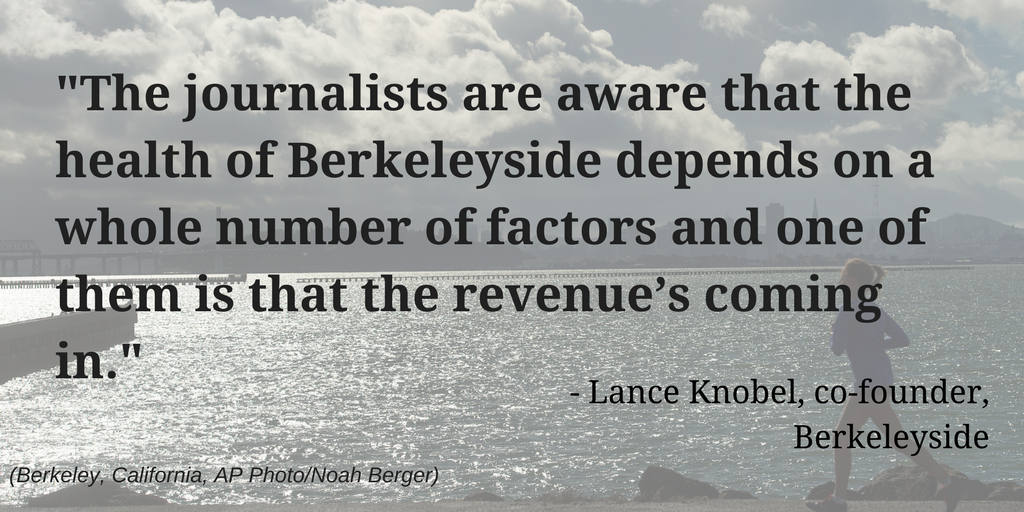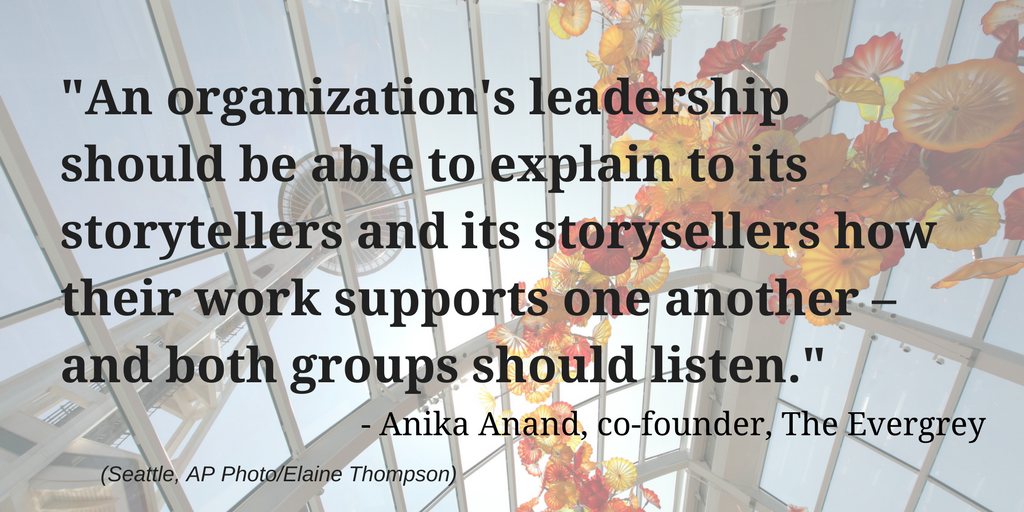This piece originally appeared in Local Edition, our newsletter following the digital transformation of local news. Want to be part of the conversation? You can sign up here.
I suspected, when I asked last week for people to share what their work means to their organization's bottom line, that I'd get several things: Shrugs, scowls and silence.
That's pretty much what happened. And that's okay.
It's far easier for all of us, myself included, to focus on the craft and mission of what we're doing. But the business model that no longer works, and the many that could replace it, are pretty much everyone's business right now.
That doesn't mean journalists should make editorial choices based on the business stuff. It does mean we should understand how things work and why.
And when you boil it way down, Lance Knobel told me, it's not that tough.
"Publishing is a ridiculously simple business," said Knobel, co-founder of Berkeleyside. "… Everyone needs readers."
Whatever the model is – ads, subscribers, memberships, events – readers, or audience, or humans, are the crucial ingredient.
"Everything, everything, depends on readers," Knobel said. "That’s the only thing, in some ways, that matters."
I reached out to a few people who have started thinking about the business of what we do. Here's what they said:

At Berkeleyside, journalists aren't thinking about the business side in a direct way, Lance said, but their journalism is everything in terms of the bottom line.
"Our journalism is why people read Berkeleyside, and without readers, we would be nothing. Our advertising team recognizes that. They get as excited about big breaking stories as our journalists do because they see that as their calling card as well, telling people how vital this is and how important it is and how people rely on Berkeleyside and look to Berkeleyside … I really think it’s everything. It’s the journalism that drives everything we do."
There's a more direct link between the journalism and Berkeleyside's membership program. When big news happens in Berkeley, and it has been lately, they cover it and later Berkeleyside reaches out via email with a call to become a member. Tying that call to the journalism is overwhelmingly effective, Lance said.
Berkeleyside is small enough, with nine on staff, that everyone knows each other.
"The journalists are aware that the health of Berkeleyside depends on a whole number of factors and one of them is that the revenue’s coming in," he said.
They will not do a story just for clicks, he said, and they will not cover a story because it serves an advertiser's needs.
There's still a separation of church and state, Lance said.
"But maintaining that separation doesn’t mean lacking awareness or understanding."
Anika Anand is the co-founder of Seattle's The Evergrey. Some of this is on the organizations themselves, she said.
"I think it's just as much of an organization's responsibility to explain how the business works to all of its employees as it is for journalists to take responsibility for understanding how the business works. That's to say that a culture of 'we're in this together' should start at the top. An organization's leadership should be able to explain to its storytellers and its storysellers how their work supports one another – and both groups should listen."
Evan Benn edits Indulge, the Miami Herald's luxury lifestyle magazine. He previously worked as the Herald's food editor and before that, at the St. Louis Post-Dispatch.
"A big part of what attracted me to this challenge was the opportunity to learn about and have a more direct effect on the business side of publishing — something we are mostly shielded from, for better or worse, in the newsroom," he said.
Indulge's production and budget comes out of the Herald's advertising department. He manages the editorial side without any influence from advertisers, he said.
"We are not pay-to-play, and any advertorial or sponsored content we run is clearly marked as such. But I also work hand-in-hand with our publisher, our advertising managers and our events team to collaborate on meeting current goals and uncovering new revenue streams."
Working on the business side, after years on the editorial side, has helped him see what both groups offer and need.
"I can say it's doubly rewarding, each time a new issue of Indulge comes out, to be proud of its editorial content and to be aware of the bottom-line contribution the whole thing makes to the business."

Thanks, everyone, for reading. Next week, we'll talk with Andaiye Taylor, founder and editor of Brick City Live.
In the meantime, see how one journalist felt the media got it wrong with hurricane coverage. Becoming a chocolatier is a pretty great Plan B. And check out this free course from Poynter's News U on alternative story forms.







